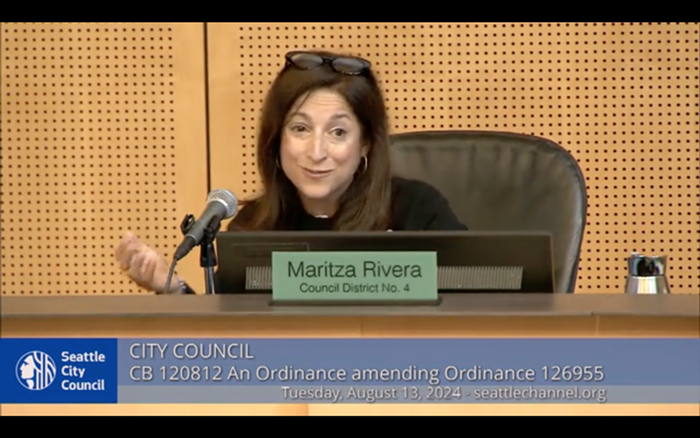And so it begins. With the primary election weeks away, outside conservative interests started throwing cash at the 2024 race for the citywide city council seat. Big business won all but one seat on the council in 2023 because they outspent the labor lobby five fold. If labor wants more representatives in City Hall, then they may not want to take such a hands-off approach this go-round.
Washington Realtors Political Action Committee (WRPAC) spent $60,000 on advertising to promote incumbent Tanya Woo, according to a July 16 Public Disclosure Commission filing. Of the $60,000, WRPAC spent $16,000 on video ads delivered via streaming services, $6,500 on other online video advertising, $4,000 on display ads like banners on websites, and another $5,000 to “retarget” those display ads, presumably to maximize their reach and efficacy.
Somebody tell Tanya Woo’s that ballots haven’t even dropped yet. Understand how she might be confused since she didn’t bother to vote in city elections until 2021. #seaelex https://t.co/ttnrgR4ekH pic.twitter.com/aQVAfBEvvj
— Heather Weiner (@hlweiner) July 17, 2024
WRPAC calls itself one of the largest PACs in Washington that funds and endorses both Democratic and Republican candidates who support policy that favors the real estate industry. I asked WRPAC which policies they want to see enacted on the city level, but they did not respond.
You might think that a realtor PAC would support the candidate who would maximize housing production, but at the same time, realtors profit from the sale of housing, so the higher the cost of housing the better. Moreover, the PAC mostly represents brokers and agents who sell single-family houses, so density isn’t really their thing. All of that means they may pick the candidate who is most likely to defend exclusionary zoning and limit supply, which keeps housing expensive. The National Association of Realtors, a different PAC with the same interest, backed Council Members Joy Hollingsworth, Bob Kettle, Maritza Rivera, and Woo in their 2023 campaigns against much stronger pro-density candidates.
“Realtors earn commissions on the sales of homes; they profit from the broken status quo in Seattle that produces ever-rising housing costs,” said Suresh Chanmugam, organizer at Tech 4 Housing, which endorsed Woo’s competitor, Alexis Mercedes Rinck. “They are worried that [Rinck] will enact policies that will make Seattle more affordable, such as reforming our racist land use laws, funding Social Housing with progressive revenue, and protecting renters against price gouging.”
When asked about what WRPAC's support says about her campaign, Woo reminded The Stranger that Independent expenditure committees are separate from the candidate's campaign and they cannot coordinate.
Woo reiterated her efforts to preserve the Chinatown International District.
"I have also been, and continue, to fight gentrification and displacement in a neighborhood that is known as one of the nation’s most endangered neighborhoods," Woo said in an email. "Those racist land use policies yes, I have been affected by them."
She said she's currently working on legislation that she said "will not only build more housing but build affordable housing citywide."
Regardless of what WRPAC’s support says about Woo or Rinck, money is money. And money matters. Last year, the better-funded council campaign won in every race except for one. Importantly, that one exception was Woo’s race. She outraised her opponent between her campaign and outside spending, but she still lost.
Just because Woo is a loser does not mean the left shouldn’t take her seriously. She lost by a few hundred votes in the most progressive district in the city. She may have an easier time appealing to the whole city, which seems on average more conservative in odd years than District 2 voters. That’s especially the case now that she has name recognition as the consolation-prize council member.
So far, Fuse Votes has spent $183 on Rinck. Fuse Votes takes the total cost of their labor for their voter guide, about $35,000, and divides it among the candidates featured in it. Labor did not spend nearly as much in 2023 as they did to secure a progressive majority in 2019. Now, their coalition is paying for it. Instead of fighting for new pro-worker policies, they’re busy running defense for the gig worker minimum wage. Meanwhile, rollbacks to the terms of the Fight for $15 minimum wage and other issues workers care about are on the horizon.
Rinck has racked up labor endorsements, but it's unclear what their PAC strategy will be.




















